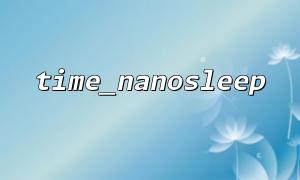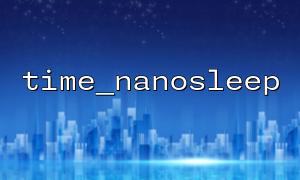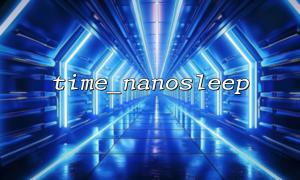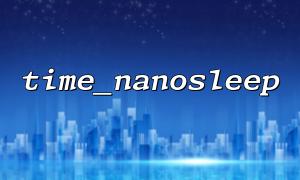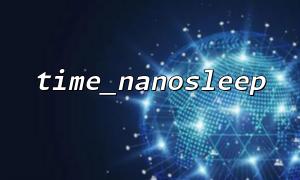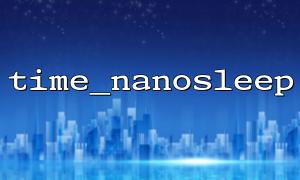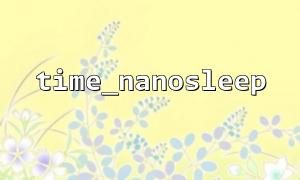time_nanosleep() is a relatively rare but very useful function when dealing with high-precision latency in PHP. It allows developers to pause scripts to the nanosecond level, which may be particularly important in some application scenarios that require high-time accuracy (such as high-frequency trading, fine task scheduling, etc.). However, since this function is an encapsulation of the underlying nanosleep() of the system, there may be differences in support for it in different operating systems. So, does time_nanosleep() work properly on Windows, Linux, and macOS? This paper analyzes this problem through actual measurements.
bool time_nanosleep(int $seconds, int $nanoseconds)
This function pauses the script for a specified time, and the accuracy can reach the nanosecond level. Its return value is Boolean, or when interrupted, returns an array containing the unfinished delay time.
For example, here is a simple usage:
<?php
echo "Start\n";
time_nanosleep(0, 500000000); // 0.5 Second
echo "End\n";
?>
To verify the cross-platform compatibility of time_nanosleep() , we tested it in the following environments:
Windows 11 (using XAMPP PHP 8.2)
Ubuntu 22.04 (PHP 8.2, using Apache2)
macOS Sonoma (PHP 8.3, installed via Homebrew)
On three machines, the test scripts are as follows:
<?php
$start = microtime(true);
time_nanosleep(0, 500000000); // pause0.5Second
$end = microtime(true);
echo "time consuming:" . ($end - $start) . " Second\n";
?>
In a Windows environment, time_nanosleep() can be used normally , but its accuracy is actually limited by the timer mechanism of the Windows system. Although the function call itself will not report an error, the actual pause time is slightly higher than 0.5 seconds, and the average is 0.502~0.505 seconds in multiple tests, with a slightly larger float and low accuracy.
Linux is a native support platform for nanosleep() , and time_nanosleep() performs best in this system. In the test, the delay time was very close to the expected 0.5 seconds, with very small fluctuations (usually within ±0.001 seconds), so it can be considered fully supported and with high accuracy .
macOS is also based on the Unix architecture and supports nanosleep() natively. The test results show that, similar to Linux, time_nanosleep() performs very stable on macOS, with a latency almost consistent with the set value and a very small floating range.
Although all three systems can run this function, there are the following points to be paid attention to:
Windows does not support high-precision sleep : Although the function will not report an error, its underlying layer is not the true nanosecond accuracy. Therefore, if the application is very sensitive to time, it is not recommended to rely on time_nanosleep() under Windows.
Alternatives :
If only microsecond delay is required, use usleep() (supported to one millionth of a second):
usleep(500000); // 0.5 Second
For scenarios that require cross-platform precision control, active polling can be combined with microtime() .
Error handling :
If time_nanosleep() is interrupted by the system signal, it will not continue to sleep, but will return to the unfinished time period.
$result = time_nanosleep(2, 0);
if (is_array($result)) {
echo "Being interrupted,Remaining:{$result['seconds']} Second {$result['nanoseconds']} 纳Second";
}
time_nanosleep() performs well on both Linux and macOS platforms, with high accuracy and stable accuracy; while it can be used on Windows, its accuracy is limited and is not suitable for strict latency control. In cross-platform projects, developers are advised to select appropriate delay functions based on the specific operating environment and conduct sufficient testing of time-sensitive operations.
If you need to further control the accuracy or build an asynchronous task framework, you can consider using an external scheduler or combining pcntl expansion to implement multi-process processing (limited Unix systems). If your service is deployed on Linux, time_nanosleep() is a safe and reliable option.
Attachment: Project test code hosting address: https://gitbox.net/time-nanosleep-demo



